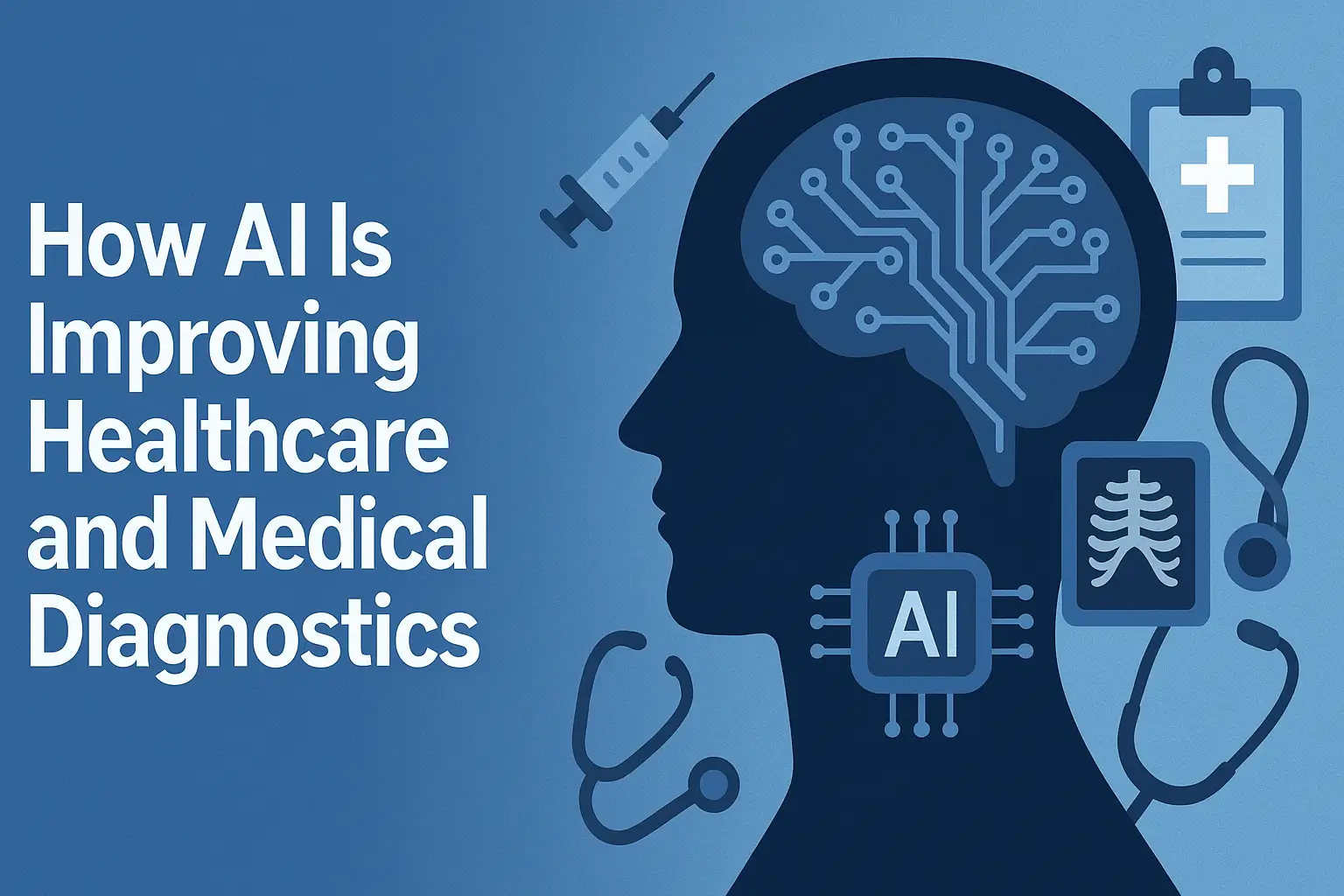Artificial Intelligence (AI) is rapidly transforming the healthcare industry, offering new levels of accuracy, speed, and efficiency in diagnosing diseases, personalizing treatments, and managing patient care. From hospitals to clinics to research labs, AI-powered technologies are reshaping how medical professionals make decisions and deliver care.
In this article, we’ll explore how AI is improving healthcare and medical diagnostics, the tools making it possible, and what the future holds.
AI in Healthcare: An Overview
AI in healthcare refers to the use of machine learning algorithms and software to analyze complex medical data. These systems assist doctors, researchers, and clinicians by:
- Detecting diseases earlier
- Supporting clinical decisions
- Automating routine tasks
- Enhancing medical imaging analysis
- Managing patient data
With the right data, AI can learn to identify patterns that humans might overlook, helping healthcare professionals provide faster and more precise care.
Key Applications of AI in Medical Diagnostics
1. Medical Imaging and Radiology
AI is revolutionizing how radiologists interpret scans by analyzing X-rays, MRIs, and CT scans with exceptional accuracy.
Examples:
- Lung cancer detection: AI systems flag abnormal lung nodules with higher precision than manual analysis.
- Breast cancer screening: Tools like Google Health’s AI model have achieved accuracy comparable to top radiologists.
- Fracture detection: AI highlights subtle fractures in X-rays, reducing missed diagnoses in emergency rooms.
2. Predictive Analytics
AI can analyze a patient’s medical history, genetic profile, and lifestyle factors to predict the likelihood of developing certain diseases.
Examples:
- Forecasting the risk of heart attacks or strokes
- Identifying patients prone to diabetes or chronic kidney disease
- Predicting hospital readmission rates
Predictive models allow doctors to intervene early, potentially saving lives and reducing healthcare costs.
3. Pathology and Lab Analysis
AI-powered microscopes and image recognition tools are helping pathologists analyze tissue samples faster and more consistently.
Use Cases:
- Detecting abnormalities in cell samples
- Identifying cancerous cells in biopsies
- Automating blood analysis in large-scale labs
4. Genomics and Personalized Medicine
AI accelerates the processing of genomic data, helping researchers understand how individual genetic variations affect disease risk and treatment response.
Benefits:
- Faster analysis of genetic sequences
- Matching patients with targeted therapies
- Identifying rare genetic disorders
5. Virtual Health Assistants
AI chatbots and voice assistants guide patients through symptoms, medication reminders, and follow-up care.
Examples:
- Babylon Health, Ada, and HealthTap provide 24/7 access to symptom checkers and health insights
- Mental health support tools like Woebot offer AI-driven cognitive behavioral therapy
How AI Is Enhancing Clinical Decision Support
AI doesn’t replace doctors—it augments them. Clinical decision support systems (CDSS) analyze data from electronic health records (EHRs), lab tests, and medical literature to assist physicians in diagnosing and treating patients.
Key Benefits:
- Reduced diagnostic errors
- Standardized treatment recommendations
- Real-time alerts and reminders
- Faster access to relevant medical research
Benefits of AI in Healthcare
- Faster Diagnoses: AI can analyze medical images and data in seconds.
- Improved Accuracy: Reduces human error and enhances diagnostic confidence.
- Cost Savings: Automating tasks lowers operational costs.
- Patient-Centric Care: Personalized insights help doctors tailor treatments to individual needs.
- Operational Efficiency: AI automates scheduling, billing, and inventory management.
Challenges and Ethical Considerations
Despite its promise, AI in healthcare comes with challenges that must be addressed:
1. Data Privacy and Security
Medical data is sensitive. AI systems must comply with data protection laws (e.g., HIPAA, GDPR) and ensure secure handling of patient records.
2. Bias and Fairness
AI can inherit biases from training data, leading to unequal treatment or misdiagnoses—especially in underrepresented populations.
3. Explainability
Many AI models operate as “black boxes,” making it difficult to understand how decisions are made. Transparency is vital in healthcare.
4. Regulation and Approval
AI tools must undergo rigorous clinical validation and regulatory approval before being used in patient care.
5. Integration with Existing Systems
Hospitals and clinics must invest in infrastructure to integrate AI with current software, workflows, and staff training.
Future Trends in AI and Healthcare
- AI-powered wearables for real-time health monitoring
- Digital twins of patients for simulation-based care planning
- Voice AI for medical dictation and documentation
- AI in surgery with robotic assistance and real-time feedback
- Federated learning to protect data privacy while training models collaboratively
Final Thoughts: A Smarter, Healthier Future
AI is not a futuristic vision—it’s already enhancing diagnostics, saving lives, and supporting medical professionals around the world. While challenges remain, the integration of AI into healthcare offers tremendous potential to make medicine more accurate, efficient, and personalized.
By continuing to prioritize ethical development, robust testing, and responsible implementation, AI can help shape a future where better health outcomes are accessible to all.
